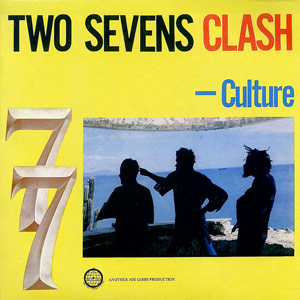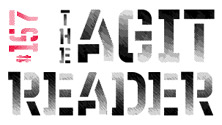
Two Sevens Clash
VP
When Culture released the single “Two Sevens Clash” in 1977, the song captured the nervous anticipation that pervaded Jamaica that year. Based on a prophesy by Rastafarian figurehead Marcus Garvey, the song celebrated the predicted apocalypse that would supposedly come that year when the two sevens met, most likely on July 7, when all the sevens would align. The song was a massive hit for the vocal trio, which consisted of leader Joseph Hill, Albert Walker and Kenneth Dayes and had been formerly known as the African Disciples. The song became the centerpiece for the album of the same name, released later the same year on the Joe Gibbs label, whose namesake produced the record in tandem with his Mighty Two partner Errol Thompson.
A hit at home and abroad, Two Sevens Clash remains a classic nearly a quarter-century later—and for good reason. With musical backing by the Revolutionaries, who featured the burgeoning talents of Sly Dunbar and Robbie Shakespeare, the album weaves styles past and present into its roots mix. Two Sevens Clash epitomized the sound and temperament of Jamaica at the time of its recording, but its staying power is obvious on this newly remastered and reissued version.
With an underlining rocksteady sway, the title track’s lighthearted lilt belies the song’s message of impending doom and instead emphasizes optimism for the afterlife. It is this kind of complex relationship between the album’s lyrical and musical content that gives Two Sevens Clash its singularity and makes it stand out amongst most roots reggae records and the genre at large. Even on the seemingly common rasta call-to-arms of “Natty Dread Taking Over,” the band forgoes any sense of urgency for a laidback beat and horn-laced melody. It’s as if the song’s mellow vibe is indicative of the dreads’ dominance.
In addition to being a success in Jamaica, Two Sevens Clash was popular in the UK where the punks had taken to reggae. It is easy to hear the album’s impact, with its heavy reliance on keyboards and the ska accents of songs like “Black Starliner Must Come” no doubt having an influence on the Two Tone label’s meshing of punk and ska in subsequent years. Moreover, it’s hard to imagine how reggae at large might have developed without this touchstone.
Nonetheless, even evaluated on its own, Culture’s debut is impossible to overestimate. Hill and his partners’ golden-hued voices hearken beyond reggae to the gospel roots of soul and R&B (check “Jah Pretty Face,” in particular), and it’s hard not to hear the album within the greater lineage of black music. Indeed, this record is a classic in the purest sense and without parameters. Two Sevens Clash might have been meant to mark a coming catastrophe, but instead stands on its own as a mighty slab of music.
Stephen Slaybaugh
PAST PERFECTS
Stone Coal White, Stone Coal White
Father's Children, Who's Gonna Save the World
Paul McCartney, McCartney and McCartney II
Peter Tosh, Legalize It and Equal Rights
Sebadoh, Bakesale
Love, Black Beauty
Reatards, Teenage Hate
DOA, Something Better Change and Hardcore 81
Simple Minds, Sparkle in the Rain
Mercury Rev, Deserter's Songs
Blank Dogs, Collected By Itself: 2006-2009
The Kinks, Kinks, Kinda Kinks and The Kink Kontroversy
The Zeros, "Main Street Brat" and The Normals, "Almost Ready"
Pearl Jam, Vs. and Vitalogy
